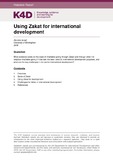| dc.contributor.author | Ismail, Zenobia | |
| dc.date.accessioned | 2018-04-19T14:54:17Z | |
| dc.date.available | 2018-04-19T14:54:17Z | |
| dc.date.issued | 2018-03-23 | |
| dc.identifier.citation | Ismail, Z. (2018) Using Zakat for International Development. K4D Helpdesk Report. Birmingham UK: University of Birmingham. | en |
| dc.identifier.uri | https://opendocs.ids.ac.uk/opendocs/handle/20.500.12413/13647 | |
| dc.description.abstract | This review focuses on Zakat, a particular form of almsgiving within Islam. The value of Zakat is estimated to range from US$ 200 billion to US$ 1 trillion per annum across the world (Stirk, 2015) or around US$ 187 million among countries in the Organisation of Islamic Co-operation (Shaikh, 2016). Therefore, interest in mobilising Zakat for poverty alleviation in Muslim majority countries as well as for international development is rising. Zakat is an important source of funding for Muslim humanitarian organisations which operate across the globe. However, de-risking, a term coined in the banking sector to reduce the risk of money laundering and funding of terrorism by blocking international transactions or raising the criteria for processing them, is the most serious challenge faced by Zakat collecting Muslim charities. | en |
| dc.language.iso | en | en |
| dc.publisher | Institute of Development Studies | en |
| dc.relation.ispartofseries | K4D Helpdesk Report; | |
| dc.rights.uri | https://www.nationalarchives.gov.uk/doc/open-government-licence/version/3/ | en |
| dc.subject | Development Policy | en |
| dc.subject | Finance | en |
| dc.title | Using Zakat for International Development | en |
| dc.type | Other | en |
| dc.rights.holder | DFID | en |
| dcterms.dateAccepted | 2018-03-23 | |
| rioxxterms.funder | Default funder | en |
| rioxxterms.identifier.project | K4D | en |
| rioxxterms.version | NA | en |
| rioxxterms.funder.project | 0986883a-6d0f-4bb8-9c46-5e0682934d65 | en |

